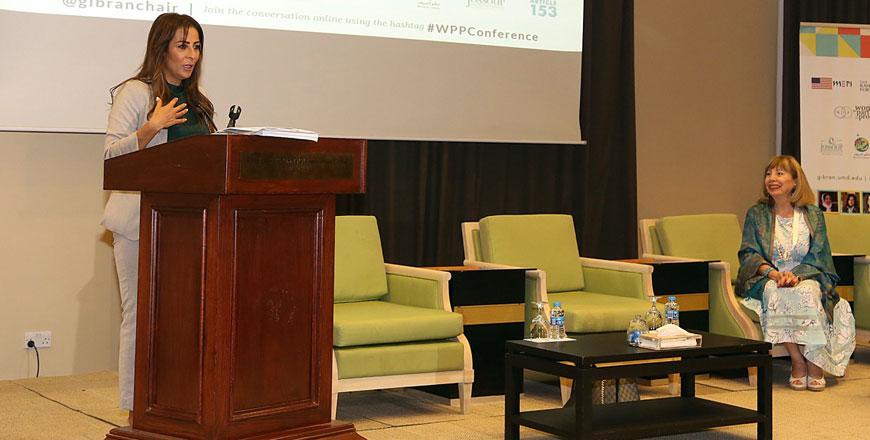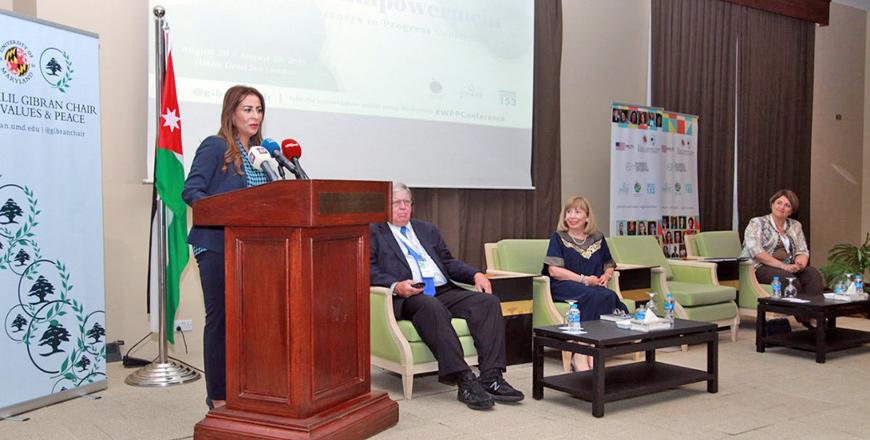You are here
Women’s conference ends with call to continue struggle towards empowerment
By Rana Husseini - Aug 28,2019 - Last updated at Aug 28,2019

Minister of State for Media Affairs and Government Spokesperson Jumana Ghunaimat speaks during the closing session of a women’s empowerment conference at the Dead Sea on Wednesday (Petra photo)
DEAD SEA — Societies will not achieve their aspirations if they do not empower women in all fields.
This was the key message that Minister of State for Media Affairs and Government Spokesperson Jumana Ghunaimat stressed during the closing session of a three-day conference on Wednesday that was held at the Dead Sea titled “Innovative Approaches to Women’s Empowerment”.
“There is still a long away for women to achieve their goals in this area and it is our role to work on empowering women and amending the wrong values that could hinder their advancement,” Ghunaimat told some 150 activists and leaders participating from countries of the region and the US.
The key, Ghunaimat stressed, is “to believe in our demands and unite as civil society and governments so we can move forward”.
The minister added that other steps to be adopted include focusing on amending legislation “that allows economic violence against women and work on the media to eliminate all stereotypical images that are sometimes published in the media outlets”.
The Women as Partners in Progress (WPP) conference, which is being held at the Hilton Dead Sea Convention Centre, included panels from each partner organisation, which highlighted their accomplishments and the results of their contributions to the empowerment of women in their countries.
The activists and leaders gathering at the Dead Sea aimed to discuss the outcome of a two-year project that focused on increasing women leaders’ knowledge of gender roles and women’s rights in Jordan, Morocco and Kuwait.
The event was organised by the Gibran Chair at the University of Maryland (GCUM) as part of the WPP initiative. It aims to identify and advance key issues that affect women’s daily lives and to amplify the voices of women leaders in the three countries, according to a statement by the WPP.
Director of the GCUM May Rihani also presented an inspiring speech at the closing ceremony stressing that the societies will not move forward if women are not empowered.
“If we do not work in a united manner and support each other and provide a solid action plan, the society will not advance,” Rihani said.
Rihani added: “We know we can break barriers and we need to continue… no barriers are unbreakable and we need to continue the struggle to ensure a better life for the younger generation.”
The WPP, which started in late 2017 and is a project funded by the US Department of State’s Middle East Partnership Initiative (MEPI), aims to promote women’s leadership and gender-inclusive policies working with partners in Morocco, Jordan and Kuwait, according to the WPP statement.
In addition to the three delegations from Jordan, Morocco and Kuwait, representatives from six other Arab countries were attending, including Egypt, Lebanon, Saudi Arabia, Tunisia, the United Arab Emirates and the West Bank and Gaza, the WPP statement added.
Head of the Jordanian delegation Mayyada Abu Jaber, who is the CEO of World of Letters, said the work on addressing issues related to women’s participation in the labour market will continue.
“We will continue to work on legislation related to sexual harassment at work and other topics related to women’s economic empowerment,” Abu Jaber said in her closing remarks.
Meanwhile, President of the Legislation and Opinion Bureau Fida Hamoud, the first woman to be assigned to this post, pledged to work on amending legislation in favour of increasing women’s participation in all forms of professions.
“I hope that through my post I will be able to contribute to working on all the laws that affect women’s lives in Jordan, especially laws related to women’s empowerment,” Hamoud, a former senator, stressed.
MEPI Programme Director Rita Stephan concluded by urging the participants to continue the journey of activism saying: “We owe it to the next generation to leave our own legacy.”
“We should not depend on one person, one leader or one issue. We should unite our efforts and expand the circle of resources to include men as our allies, and the private sector,” Stephan said.
Arab women are truly change makers, Stephan added, saying, “I want to challenge you to make the year 2020 an even bigger year for women in terms of gaining more achievements in this region.”
Related Articles
DEAD SEA — Minister of State for Media Affairs and Government Spokesperson Jumana Ghunaimat on Monday said that Jordan, represented by the l
AMMAN — Over 150 activists and leaders will gather at the Dead Sea on Monday to discuss the outcome of a two-year project that focused
AMMAN — In celebration of International Women's Day, Women As Partners in Progress Network (WPP) held a dinner party in Amman on Sunday for















